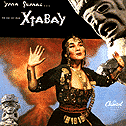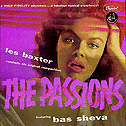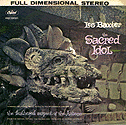with James Call and Peter Huestis
|
PH - Tell me more about working with Yma Sumac. LB - She was definitely an Inca princess--not from Brooklyn or anything else. And quite a remarkable person with a remarkable voice. But she was South American, plus Inca, you know, mestiso. Unfortunately that made for a very volatile person, very temperamental, very fiery. One moment she was, "I love you! You are marvelous! I kill you!" All in one paragraph. And she really did say, "I kill you!" I thought I was going to die right then.  PH - And her husband was very overbearing? LB - Egotistical. No talent whatever. But she was a marvelous talent. I think she's mad at me but I don't know why. PH - Seems to me that she should be grateful to you. LB - Oh, she should, of course. PH - Arranging her most successful album. LB - I did her only successful album, which I don't think she realizes. It was because of my music it was a success, very frankly. Because she had made other albums. But some one ... whether it was one bad review of my album--some magazine--ESOTERIC MAGAZINE--saying, "Baxter Hollywoodized this great folk talent." And my reply was, "Go out and buy her folk albums." There were two or three that didn't sell a thing. PH - You arranged VOICE OF THE XTABAY. LB - Yeah. And that was the only album that sold. It was the biggest selling album in the world. So I must have had something to do with it. I also know what to use of hers. Because she made many other albums that didn't sell. I mean, she had hit that high up many times before. PH - You gotta know where to put that high up. LB - Speaking of where to put it, I was very particular and we were into cutting tape then. It was before we had all the buttons we have now. So we could edit. We simply had her do her phrases until we got one we liked. And then we had a phrase going up high. And then we had her rest--had her sit down--"Hit a high f," and when she finally hit the high f we'd paste it in on the end of the progression. So she's pasted together a lot. PH - I know on one of these other records there's a remarkable female vocalist.  LB - Bas Shiva. PH - Yes. I believe that's on THE PASSIONS. I know the liner notes it talks about you traveling all over the world to collect sounds for this album. Is that an exaggeration? LB - I don't think I got any farther than Glendale. No, it's not true. I hadn't been to South America or Cuba or anyplace when I did my exotic stuff. It just came out of nowhere. Later on I went to Cuba. And when I was in Cuba it was quite an interesting experience because I was staying with an Italian princess--pretty big on the echelon--uh, at her chateau. I could go into a lot of stories about the princess. But anyway, I was there during carnival. So I heard carnival in Havana, which is quite marvelous. I heard carnival in Rio, too. But carnival in Havana is more African and much earlier. JC - Something I'm curious about. SKINS was a big seller for you. I was wondering if you know anything of the demographics--what kind of people bought that record. It seems like anything from beatniks to ... LB - Everybody bought it. I had some interesting experiences with the wide range. Somebody at Capitol told me--it was very surprising--he said this MUSIC OUT OF THE MOON, which was theremin and choir--it had a little jazzy feel in a couple of places--he said this is selling in South Central L. A. So anyway, we could never figure anything out. JC - Well, it's something so strange it just finds its own niche, I guess. LB - That's interesting because a lovely black woman called me and she said I have just got to have a copy of your album, THE PASSIONS. I said, "THE PASSIONS?" She said, "Oh, yes, we just love THE PASSIONS. I'm playing it for all my friends and I've got to get a copy of it. So they were hot for THE PASSIONS. That is where the woman screams on it. I hate the scream. And I was in New York at the time. I made the album and I went to New York to do something. The producer finished it and he put a scream at the end of Terror, which I never intended. It's just a blood curdling scream. It is so unmusical. Terrible. PH - Were there any interesting experiments you tried with music that just flopped? LB - Never. PH - Never? You're sure about this?  LB - Absolutely. PH - What do you think the strangest music you've made is? LB - Well, the strangest music I've made? Ahhh ... I think the choir album--the Aztec choir album is the weirdest. JC - THE SACRED IDOL? LB - THE SACRED IDOL. Yeah, it's strange. JC - It's so beautiful and strange. You get such an other worldly quality. I always thought it could've been a science fiction film score. PC - And you did a lot of science fiction and horror films. LB - Yeah. PC - You must have had to watch a lot of strange films to score them. LB - No, I was strange before. They weren't up to my strangeness. I felt they were very ordinary. PH - Do you have any favorites? LB - I think I did, but I have a tendency to forget. I think ... oh, I can't even remember what it's called, "Nude Girls from somewhere." I don't know what it was. I don't even remember doing it and I don' t know how they got my music on it, but anyway. Um, THE PIT AND THE PENDULUM was outstanding, though, because it was an atonal score. The first time I had really done mostly atonal music. Atonal is very unusual--12 tone, whatever. Modern music is okay, but atonal is different. I tend to write musical atonal music. I mean, I could not write it unmusical. But the producer heard this wild atonal cue and--I don't what reaction--and he said, "Boy, I like that! You know, there is something appealing about it." Producers really went for my stuff. One producer sat through a film in dubbing and he said, "Les, you didn't do what I asked you to do. It was better." PH - I can't imagine anyone really getting away with telling you what to do. LB - No one ever told me what to do--they told me what to do but I never did it. Because you get some insecure producer/directors who want to supervise every note. And they don't know what they are doing at all. I don't care, I know how to handle them. Um, my best score, I think, was MASTER OF THE WORLD. JC - I remember that film. Jules Verne. LB - God, you've got to get it. Please, look at that because that's the best score. I love that score. JC - One of your biggest film scores was The High And The Mighty. LB - I didn't do it. JC - You had a hit single with that. LB - I had a single on it. JC - OOOH-kay, so it wasn't part of the film score. I see. PH - What else have you been doing lately? LB - Just a little concert work and I'm always doing something and I don't know what I'm doing, you know. I'm always doing something. |
Return to Les Baxter Index
